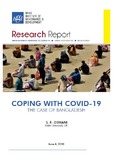| dc.contributor.author | Osmani, S. R. | |
| dc.date.accessioned | 2021-03-07T05:51:40Z | |
| dc.date.available | 2021-03-07T05:51:40Z | |
| dc.date.issued | 2020-06-08 | |
| dc.identifier.citation | Osmani, S. R. (2020). Coping With COVID-19: The Case of Bangladesh. BRAC Institute of Governance and Development (BIGD). | en_US |
| dc.identifier.uri | http://hdl.handle.net/10361/14318 | |
| dc.description.abstract | Managing the health and economic crisis caused by COVID-19 requires some inevitable trade-offs. By presenting a conceptual framework, this study, however, argues that the severity of the trade-off can be reduced by adopting a combination of three types of policy instrument: (a) physical distancing through economic shutdown; (b) bold measures of economic support; and (c) a powerful system of public health support. Such instruments will have to be calibrated on the basis of a two-phase approach in regard to the pandemic. During these two phases, it is estimated that the entitlement support program will cost 960,000 million BDT—about 3.8 per cent of the gross domestic product (GDP). | en_US |
| dc.language.iso | en | en_US |
| dc.publisher | BRAC Institute of Governance and Development (BIGD) | en_US |
| dc.relation.ispartofseries | Economy 02; | |
| dc.relation.uri | https://bigd.bracu.ac.bd/publications/coping-with-covid-19-the-case-of-bangladesh/ | |
| dc.subject | COVID-19 | en_US |
| dc.subject | Social distancing | en_US |
| dc.subject | Lockdown | en_US |
| dc.subject | Public health | en_US |
| dc.subject | Livelihood | en_US |
| dc.subject | Entitlement support | en_US |
| dc.subject | Enterprise support | en_US |
| dc.subject | Essential sector | en_US |
| dc.subject | Budget allocation | en_US |
| dc.title | Coping with COVID-19: the case of Bangladesh | en_US |
| dc.type | Research report | en_US |
| dc.descriptionType.methods | Qualitative | |

